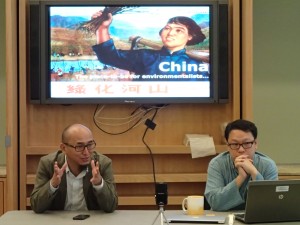We were very lucky this past week to have an excellent talk by one of our former ICI Fellows, Lo Sze Ping, who is a leading environmental activist and scholar in China. His talk was titled “Environmental Challenges and the Growing Citizens Discontent in China.”

He discussed some of the background to recent environmental issues in China, including recent PX factory protests in multiple cities across China. PX, or paraxylene, is a toxic industrial chemical. Various companies have been trying to build PX chemical plants in China in recent years, and all have been met with opposition from local communities, primarily due to the health risks from their operation. These type of plants have contributed in recent years to the problem of “cancer villages” in China, a problem which Lo said will only become more acute in the coming decades.
But not everything green is bad in China. Lo also highlighted some of the more positive recent developments, including formal efforts by the 18th National Congress of the Communist Party of China to formally incorporate the idea of an “Ecological Civilization” into state programs and policies, something that he suggested makes China unique in terms of state actions to address the environment. This is also the focus of the latest UNDP Human Development report on China, titled Sustainable and Liveable Cities: Toward Ecological Civilization. Part of this emerging ecological discourse, Lo suggested, is a reaction to the failures of the Western model of development and capitalist economic growth models, familiar to many as the “Beijing Consensus (Beijing gongshi),” which he and others have argued is simply the “Washington Consensus” with an authoritarian Chinese veneer.
Lo concluded his talk with a number of slides showing various anti-PX protests around China, as well as several examples of more formal environmental efforts, such as Beijing’s Blue Sky Visual Diary. He suggested such examples are a part of the growing landscape of Chinese environmentalism today. But exactly how these formal and informal efforts connect remains unclear, Lo suggested, due to a variety of problems. In many cases, institutional NGO’s or GONGO‘s in China cannot risk involvement with activities like the anti-PX protests, even if they are sympathetic, a problem he witnessed firsthand while he was working with Greenpeace in China.
For anyone who missed the event but wanted to come, don’t worry. You can listen to Lo’s talk below.
We’ll also be posting the video of his talk here soon. Here is the accompanying powerpoint for Lo’s talk.
